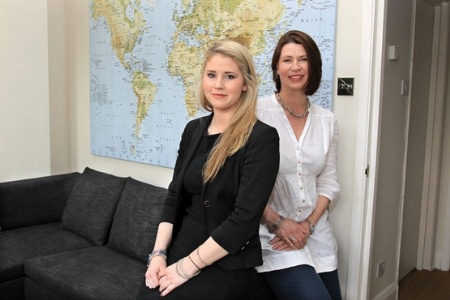Source: Corbis
Sarah Wrixon had always assumed that her eldest daughter would follow the traditional route and go to university after completing school.
But then Hattie “really began to struggle with how what she was doing in her studies connected with the world she was going into”. And as university tuition fees in England increased, so did her daughter’s doubts.
Under the new fees system, “our estimate was that even a basic three-year degree was going to cost somewhere in the region of £50,000 when you included living costs”, says Wrixon, who lives in South West London and runs a public relations agency called Salix Consulting. “That’s quite an investment.”
Then, around the dinner table one night, the family had an epiphany.
“We said: ‘There’s no law that says you have to go to university,’” Wrixon explains.
So Hattie left school, took a business training course and secured an apprenticeship at a marketing company. And now mother and daughter have created a website, Unisnotforme.com, to help other young people find alternatives to traditional higher education, such as work experience, internships, online learning or technical college.
It is part of a growing international movement propelled by the increasing cost of university and widening scepticism about its value, a trend that may accelerate with the publication in the US next month of Hacking Your Education: Ditch the Lectures, Save Tens of Thousands, and Learn More Than Your Peers Ever Will. The book is written by Dale J. Stephens, a 20-year- old disciple of billionaire Facebook backer and self-described “educational disrupter” Peter Thiel.
“I don’t have anything against universities or colleges,” says the author, who was home-schooled from the age of 12 and enrolled but dropped out of Hendrix College, a private liberal-arts institution in Arkansas. “My problem is with people going to universities or colleges simply because they think that’s what’s expected of them.
“I don’t think everyone is going to be learning outside school - that’s as silly as saying everyone should go to school. But there’s a certain number of people for whom school is an impediment, not a boost.”
Higher education officials say they are not particularly concerned about this trend. They point out that something like it crops up whenever the economy is either very weak, causing people to question the return on their investment in university degrees, or very strong, when they conclude that they can get a job without one.
“Post-secondary education is an investment, and not all investments pan out. But investing in post-secondary education is as sure a bet as anyone will ever make,” says Terry Hartle, senior vice-president for government and public affairs at the American Council on Education.

‘I have nothing against universities or colleges,’ says Dale J. Stephens. ‘My problem is with people going simply because they think that’s what’s expected of them’
On the wall of his Washington office, Hartle has framed covers from two editions of Newsweek magazine: one published in 1976 during the economic downturn that followed the oil crisis, titled “Who Needs College”; and another from September last year with the cover line “Is College a Lousy Investment?”.
And Stephens’ book is hardly unique. In 1975, Caroline Bird’s The Case against College was published, which, as Time magazine pointed out at the time, offered a familiar message: “Colleges are youth ghettos. They promise more than they deliver.”
But some things are different this time. University enrolment in the US, which grew by 11 per cent between 1990 and 2000 and by 37 per cent between 2000 and 2010, has begun to flatten out ominously: this year, it even declined slightly. In the UK, the number of applications is currently lower than it was before the £9,000 fee cap was introduced. And the likes of Stephens and the Wrixons are not simply advocating against higher education: they are pushing what they call “self-directed learning”, which is far more widely available in an age of internet courses and new credentials. Hacking Your Education, Stephens says, will offer a blueprint for the approach.
UK surveys by YouGov on behalf of Unisnotforme.com show growing scepticism about the value of higher education. Only 8 per cent of those polled strongly agree that “the rewards of university education make up for the cost”, and only 9 per cent concur that “having a degree in any subject is better than having no degree”. More say they believe that society would derive greater benefit from increasing the number of young people trained via manufacturing apprenticeships, on the job or through national vocational qualifications than it would from having more graduates.
“There is a sense of something happening out there,” Wrixon says.
Even universities are recognising, and responding to, the demand for unconventional routes to degrees. US institutions now refer to themselves as part of post-secondary, not simply higher, education to better encompass alternative training choices. Two relatively new offerings in the country are “experiential learning”, which combines university courses with work experience, and “credit for prior learning”, in which non- traditional-age students attending university can get academic credit for what they learn on the job.
Still, “America in particular is oriented toward credentials, and one of the credentials employers tend to look for is a college degree”, Hartle says. “It could be harder for a person without it…to get in through the front door.”
But that may be changing, too. For example, providers of free and low-cost online higher education are developing new kinds of assessments and credentials that employers are beginning to consider on an equal basis with conventional degrees. Technology companies in New York have teamed up with a programme called Enstitute to recruit and train promising young students straight from high school, bypassing university.
Stephens runs UnCollege, an organisation that shows people how to “hack” a higher education during “hackademic camps”, which are so popular that 150 people applied for just 10 spots on one last summer; his DIY website attracts 20,000 unique visitors a month. A start-up called RadMatter works with businesses to challenge job applicants by giving them real-world tasks through which they can prove their competence for jobs without necessarily having degrees. And a fellowship begun by Thiel pays 20 students under the age of 20 a $100,000 (£63,000) stipend to drop out of university and become entrepreneurs (Stephens was one recipient).
There are also increasingly prominent examples of people who have been wildly successful without completing university educations: Bill Gates and Paul Allen, Microsoft’s co-founders; Shawn Fanning, developer of Napster; David Geffen, founder of Geffen Records and DreamWorks; and Warren Buffett, the billionaire chairman of US multinational Berkshire Hathaway. In the UK, examples include Virgin Group mastermind Sir Richard Branson (who dropped out of school) and music and television producer Simon Cowell.
The late Steve Jobs, Apple’s co-founder, said that dropping out of university was “one of the best decisions I ever made”, although according to his authorised biography, he then returned to sit in on classes without paying for them. And a survey by the news service Bloomberg found that among the 500 most valuable companies as listed by Standard & Poor’s, more chief executives dropped out of university than graduated from any single institution bar the University of California.

‘There’s no law that says you have to go to university,’ says Sarah Wrixon. Her daughter Hattie left school for a businesstraining course. Their website covers higher education alternatives
Unisnotforme.com keeps a running list of such success stories - for example, Jamie Dunn, a 21-year-old entrepreneur who has already started and sold his first business, and Charlie Mullins, the self-taught founder of the multi-million-pound plumbing company Pimlico Plumbers, whose celebrity clients include Cowell, Branson and actress Keira Knightley (another who did not attend university).
Stephens is less comfortable with such comparisons. “In some ways those stories hurt the conversation,” he says. “You get parents who cite those examples and say to their kids: ‘You’re not Bill Gates. You’re not Steve Jobs. You’re going to be a failure if you drop out of college.’”
It makes people think, he says, that “either you drop out of college, move in with your parents and smoke pot in the basement or you start Facebook. That leaves no room for people like me, in the middle, who want to live independently and contribute to society.”
Hartle has an issue with the list of wealthy dropouts, too.
“If you think you are Bill Gates, Steve Jobs or Richard Branson, you don’t need post-secondary education. If you think you’re in the remaining 99.99 per cent of young adults, you probably will benefit from it.”
In fact, even in the Unisnotforme.com survey, 54 per cent of people say the benefit of attending university is being able to get a well-paid job (although more than a third cite “a robust social life”).
And Wrixon’s youngest daughter is university bound, but that’s not the point, Wrixon says: the trend is really about overcoming the unquestioning convention that a traditional higher education is for everyone.
“When we challenged kids, they said, ‘Of course I have to go to university,’” she says. “There is a lot of conditioning from parents, and a stigma, particularly in our world [of middle-class families]. Nobody’s saying it’s the wrong thing to do, but think about it hard. For most of us, when we invest in something, we want a good return. So be clear about what you want back, and if it’s just three years having fun, be sure that you can afford that as a longer-term consequence.”
Among the things “unschoolers” are rebelling against is what they see as the persistent rigidity of higher education, Stephens adds.
“I would like to see more people understand that they have the power to make their own decisions, which is hard to learn in an environment where you have got teachers telling you what you have to do or what core courses you have to take to satisfy your major,” he says.
“For years I had to defend my choice to leave school against everyone who told me that my life was going to be a miserable failure. But doing something different, standing out, was actually the greatest advantage I could have given myself. It went from something that I had to explain…to being a badge of honour.”
Register to continue
Why register?
- Registration is free and only takes a moment
- Once registered, you can read 3 articles a month
- Sign up for our newsletter
Subscribe
Or subscribe for unlimited access to:
- Unlimited access to news, views, insights & reviews
- Digital editions
- Digital access to THE’s university and college rankings analysis
Already registered or a current subscriber?




